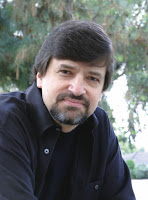Mark Masters sets down new arrangements of classic Ellington charts
 |
| Mark Masters displays comfortable artistry. |
An arranger with fresh ears for classic jazz and Great American Songbook sounds, Mark Masters here takes on a landmark Duke Ellington band of 80 years ago. The ensemble is often labeled the Webster-Blanton band, and Masters' aim was to see if 21st-century magic could be wrung from some of the ensemble's most famous tunes with new personnel and different settings.
The Mark Masters Ensemble has already displayed the bandleader's arranging skills with CDs devoted to new treatments of Alec Wilder's songs, Gershwin's "Porgy and Bess," and the music of trumpeter Clifford Brown, like Blanton a rising star cut off in his prime.
"Masters and Baron Meet Blanton & Webster" is the mouthfilling title of the new disc (Capri Records Ltd.), and the second name refers to plunger-trombone master Art Baron, an Ellington alumnus. He lends some authentic solo flavor to the arrangements; another stalwart whose name didn't fit into the title (though it deserves to) is the veteran trumpeter Tim Hagans.
"All Too Soon" may be a lesser known Ellington composition to introduce the set, but significantly it helped usher in tenor saxophonist Ben Webster to the Duke's wide public, which had already been cultivated in the area of tender balladry by altoist Johnny Hodges. In a clever stroke that sets a seal on the arrangement without overelaboration, it ends with the ensemble tooting half of the song's first phrase.
On the other side of the hyphenated nickname for that Ellington era (1940-42) was the short-lived bassist Jimmy Blanton, who innovated the crucial voice of the double bass in giving harmonic heft to big-band rhythm sections. Masters salutes the Blanton legacy by allowing prominent recorded space, in both background and foreground, for bassist Bruce Lett, not only on "All Too Soon" but also in Billy Strayhorn's "Passion Flower" and "Take the 'A' Train."
The latter piece, the band's signature tune, is well set up by Lett's fills between phrases before he takes his solo. Three other features are worth noting: Masters streamlines the famous melody, leaving out a few notes without sacrificing its obvious identity; elsewhere, he approaches a tune obliquely, as in "What Am I Here For," but then chooses to have the familiar melody stated at the outset (Danny House's clarinet in "Perdido").
The second special thing in the "'A' Train" arrangement is the comfortably wide-ranging trumpet solo. Unlike some other Ellington trumpeters I could name — and who would be without them, really? — Hagans eschews a preening, showboat approach to soloing, here and wherever else he moves into the spotlight.
Still, he displays an individuality worthy of the principal guest star, trombonist Baron, who is at his best, whether muted or not, in "Ko-Ko" or "In a Mellotone," where he makes a lively response to every sax section call. Finally, there is deft, rifflike insertion of phrases in "'A' Train" from the evergreen "Exactly Like You." That amounts to a wry commentary on a set that, for all its evident respect for the original, is to its credit not exactly like the Blanton-Webster band, but creatively swerves away from it.



Comments
Post a Comment